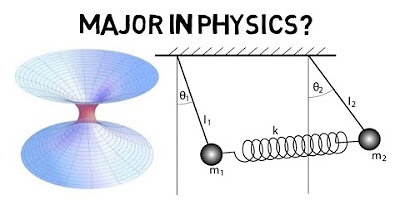The Math You Need to Study Theoretical Physics!
TLDRIn this insightful video, Aik delves into the essential mathematics required for a successful career in theoretical physics. He emphasizes that a strong foundation in math not only aids in understanding physics but also stands as a valuable field in its own right. Aik outlines the importance of calculus for mechanics, highlighting its role in understanding how variables change over time. Multivariable calculus is crucial for grasping electromagnetic laws, while differential equations, linear algebra, and complex analysis form the backbone of quantum mechanics. General relativity demands a grasp of differential geometry to comprehend the geometric properties of curved surfaces. Particle physics relies heavily on group theory to understand the symmetries and transformations underlying particle interactions. Finally, quantum field theory, which combines quantum mechanics with special relativity, necessitates a comprehensive understanding of various mathematical disciplines. Aik's video serves as a guide to the mathematical prerequisites for different subfields of theoretical physics, encouraging aspiring physicists to embrace the beauty and utility of math in their studies.
Takeaways
- 📚 **Importance of Math in Physics**: A strong foundation in math is crucial for success in theoretical physics, engineering, and computer science.
- 🎓 **Undergraduate Background**: Many individuals who pursue theoretical physics have a math undergraduate degree, highlighting the subject's significance.
- 🏫 **Academic Integration**: Theoretical physics departments are often housed within math departments, as seen in institutions like Cambridge University.
- 🌟 **Famous Physicists' Math Skills**: Renowned physicists like Einstein had robust mathematical backgrounds, emphasizing math's role in physics.
- 📈 **Mechanics and Calculus**: Calculus is essential for understanding mechanics as it deals with how variables change and are interrelated.
- 🧲 **Electromagnetism and Multivariable Calculus**: Multivariable calculus is vital for comprehending electromagnetic laws, which are expressed using its operators.
- 🚀 **Quantum Mechanics**: Key mathematical fields for quantum mechanics include differential equations, linear algebra, and complex analysis.
- 🧬 **Particle Physics and Group Theory**: Group theory, which involves symmetries and transformations, is fundamental in particle physics for understanding systems defined by Lagrangians.
- 🌌 **General Relativity**: Differential geometry is the primary math field for general relativity, focusing on curved spaces and their properties.
- 🧮 **Quantum Field Theory**: This advanced field combines quantum mechanics with special relativity and requires a broad understanding of various math areas, including group theory and differential equations.
- 🔬 **Philosophical Insights**: A bit of philosophy can help understand why conservation laws exist and their foundational principles in physics.
Q & A
Why is math considered important for theoretical physics?
-Math is crucial for theoretical physics because it provides the tools to solve complex problems, understand physical laws, and make predictions. It is a fundamental language that describes the universe's structure and behavior.
What is the role of calculus in mechanics?
-Calculus is the mathematical study of how things change based on certain data. In mechanics, it helps to deduce how a system evolves over time from initial conditions, such as the motion of a ball rolling down a hill.
Why is multivariable calculus important for electromagnetism?
-Multivariable calculus is essential for electromagnetism because it deals with the study of multiple variables that change under certain laws. Maxwell's laws, which describe electromagnetic phenomena, are formulated using multivariable calculus operators.
What are the key mathematical areas needed for quantum mechanics?
-For quantum mechanics, the key mathematical areas include differential equations, linear algebra, and complex analysis. These areas help in solving equations that describe quantum systems and understanding the properties of quantum states.
How does group theory contribute to particle physics?
-Group theory is vital in particle physics as it helps to understand the symmetries and transformations that define particle interactions. The Standard Model of particle physics is heavily based on group theory, which allows for predictions about particle behavior and interactions.
What is differential geometry, and why is it important for general relativity?
-Differential geometry is a field of mathematics that studies geometric properties of curved spaces using calculus and multivariable calculus. It is crucial for general relativity because it provides the mathematical framework to understand gravity in the presence of massive objects, such as black holes.
Why is linear algebra important for quantum mechanics?
-Linear algebra is important for quantum mechanics because it describes quantum systems in a vector space. Concepts like eigenvalues, eigenvectors, and the properties of matrices are essential for understanding the behavior of quantum states.
What is the significance of complex analysis in quantum mechanics?
-Complex analysis is significant in quantum mechanics because it allows for the manipulation of complex numbers, which are essential for describing quantum states in Hilbert spaces. It helps in navigating quantum mechanics from a deeper perspective.
What is the role of the path integral technique in quantum field theory?
-The path integral technique is a method used in quantum field theory to interpret the probability amplitude for a particle to move from one state to another by averaging over all possible paths it could take. It is a key concept in understanding interactions between particles.
Why is it beneficial to study math to become good at physics?
-Studying math to become good at physics is beneficial because it allows one to develop a strong foundation in a field that is not only essential for understanding physical phenomena but also has broad applications in various areas of science and engineering.
What are some recommended resources for learning mechanics from a mathematical perspective?
-One recommended resource for learning mechanics from a mathematical perspective is the 'Mechanics' volume of Lev Landau's series on theoretical physics, which derives conservation laws from a mathematical and philosophical standpoint.
How does the study of philosophy help in understanding conservation laws in physics?
-The study of philosophy helps in understanding the 'why' behind conservation laws in physics. It provides insights into the philosophical underpinnings of why these laws exist and why they are fundamental to the functioning of the universe.
Outlines
📚 The Importance of Math in Theoretical Physics
The speaker, Aik, introduces the video by emphasizing the significance of mathematics for students of theoretical physics, as well as related fields like engineering and computer science. Aik counters the common perception of math as a difficult subject by framing it as a valuable and beautiful field that complements physics studies. The video aims to outline the types of math necessary for different subfields of theoretical physics. Aik provides context by noting that many theoretical physicists, including themselves, have a background in math, and that theoretical physics departments are often housed within math departments at universities. The importance of math is further highlighted by the strong mathematical backgrounds of renowned physicists like Einstein. The video then delves into the specific areas of math required for various eras of theoretical physics, starting with mechanics.
🔍 Math for Electromagnetism and Quantum Mechanics
The paragraph discusses the mathematical foundations needed for studying electromagnetism and quantum mechanics. Multivariable calculus is crucial for understanding electromagnetic laws, such as those formulated by Maxwell, which involve operators like the divergence (div) and the cross product. The speaker recommends studying calculus from various sources and solving numerous problems to build a strong foundation. In quantum mechanics, solving differential equations, linear algebra, and complex analysis are highlighted as essential. Differential equations are vital for understanding how quantities change and are related, exemplified by the Schrödinger equation, which describes the wave function of particles over time. Linear algebra is important for describing quantum mechanical systems in vector spaces, such as Hilbert spaces. Complex analysis is necessary for navigating the complex numbers inherent in quantum mechanics. Group theory is also mentioned as beneficial for exploiting symmetries to solve differential equations.
🌌 General Relativity and Particle Physics Math Requirements
The speaker moves on to general relativity, the prevailing theory for describing gravity, particularly in high-energy, high-mass scenarios like near black holes. Differential geometry is identified as the key mathematical field, focusing on the geometric properties of curved surfaces using concepts from calculus. Topics like manifolds, metrics, curvature, and geodesics are important for understanding the mathematical basis of general relativity. The paragraph also touches on particle physics, which deals with the fundamental constituents of matter and their interactions. Group theory, a branch of abstract algebra, is central to particle physics due to its focus on symmetries and transformations. The standard model of particle physics is based on symmetries, utilizing groups like U1, SU2, and SU3, which are crucial for making predictions about particle behavior.
🧬 Quantum Field Theory and Its Mathematical Toolkit
Quantum field theory, a step beyond quantum mechanics, combines special relativity with quantum mechanics and provides explanations for various physical phenomena, including particle creation and destruction, as well as the standard model of particle interactions. The mathematical requirements for this field are extensive, encompassing all the areas previously mentioned, plus additional concepts that are not yet fully formalized, such as the path integral technique. This technique involves averaging over many possible paths that a particle might take, which is not strictly mathematically rigorous in more than one dimension. The speaker emphasizes the need for a broad understanding of mathematics, including probability theory, statistical mechanics, and analysis, to fully grasp quantum field theory.
📝 Conclusion and Call for Feedback
In the final paragraph, the speaker offers the video as a rough guide and invites feedback from viewers. They express willingness to explain further any concepts that the audience might find challenging and encourage viewers to like and subscribe for more content.
Mindmap
Keywords
💡Theoretical Physics
💡Calculus
💡Mechanics
💡Electromagnetism
💡Quantum Mechanics
💡Differential Equations
💡Linear Algebra
💡Complex Analysis
💡General Relativity
💡Particle Physics
💡Quantum Field Theory
Highlights
The importance of math in theoretical physics, engineering, and computer science is emphasized.
Math is viewed as an advantage in learning physics, as it allows for dual expertise in both fields.
Many theoretical physicists have a strong mathematical background, including Albert Einstein and Paul Dirac.
Mechanics, the study of how bodies move under classical physical laws, requires calculus for understanding change over time.
Calculus is essential for turning physics problems into solvable math problems, especially in advanced mechanics.
Philosophical understanding of conservation laws in physics is valuable for a deeper comprehension.
Multivariable calculus is crucial for understanding electromagnetic laws, such as Maxwell's equations.
Differential equations are key to quantum mechanics, describing how quantities change and are related to each other.
Linear algebra is vital for representing quantum mechanical systems in vector spaces, like Hilbert spaces.
Complex analysis is necessary for navigating quantum mechanics, especially in complex spaces.
Differential geometry is the foundational math for general relativity, focusing on curved spaces and surfaces.
Manifolds, metrics, and geodesics are key concepts in differential geometry for understanding general relativity.
Group theory is central to particle physics, dealing with symmetries and transformations in quantum systems.
The standard model of particle physics is heavily based on group theory, which allows for predictions about particle interactions.
Quantum field theory combines special relativity with quantum mechanics, requiring a broad range of mathematical knowledge.
Path integrals, a technique in quantum field theory, involve averaging over many possibilities, which is not strictly mathematically rigorous.
Probability theory and statistical mechanics are also important areas of math for understanding quantum field theory.
The video provides a comprehensive guide to the mathematical requirements across various subfields of theoretical physics.
Transcripts
Browse More Related Video
5.0 / 5 (0 votes)
Thanks for rating:





